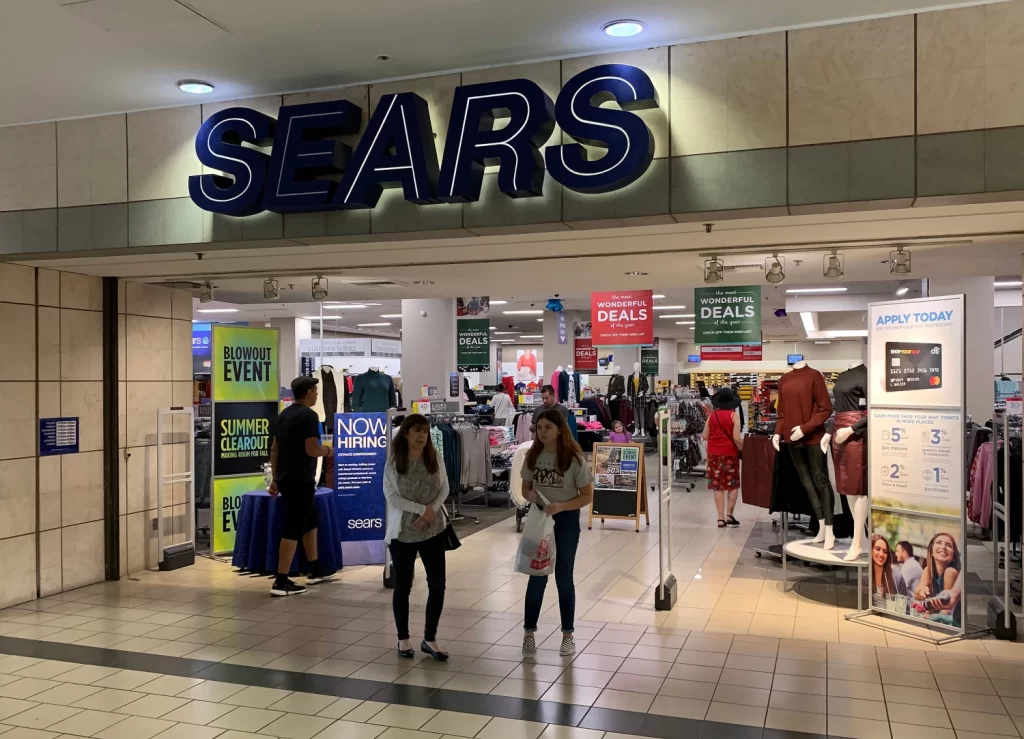IIBMS – Precision Buying, Merchandising, and Marketing At Sears
Case 3 : IIBMS – Precision Buying, Merchandising, And Marketing At Sears

IIBMS – Precision Buying, Merchandising, and Marketing At Sears
The Problem
Sears, Roebuck and Company, the largest department store chain and the third-largest retailer in the United States, was caught by surprise in the 1980s as shoppers defected to specialty stores and discount mass merchandisers, causing the firm to lose market share rapidly. In an attempt to change the situation, Sears used several response strategies, ranging from introducing its own specialty stores (such as Sears Hardware) to restructuring its mall-based stores. Recently, Sears has moved to selling on the Web. It discontinued its over 100-year old paper catalog. Accomplishing the transformation and restructuring required the retooling of its information systems.
Sears had 18 data centers, one in each of 10 geographical regions as well as one each for marketing, finance, and other departments. The first problem was created when the reorganization effort produced only seven geographical regions. Frequent mismatches between accounting and sales figures and information scattered among numerous databases users to query multiple systems, even when they needed an answer to a simple query. Furthermore, users found that data that were already summarized made it difficult to conduct analysis at the desired level of detail. Finally, errors were virtually inevitable when calculations were based on data from several sources.
The Solution
To solve these problems, Sears constructed a single sales information data warehouse. The replaced the 18 old databases which were packed with redundant, conflicting, and sometimes obsolete data. The new data warehouse is a simple repository of relevant decision-making data such as authoritative data for key performance indicators, sales inventories, and profit margins. Sears, known for embracing IT on a dramatic scale, completed the data warehouse and its IT reengineering efforts in under one year—a perfect IT turnaround story.
Using an NCR enterprise server, the initial 1.7 terabyte (1.7 trillion bytes) data warehouse is part of a project dubbed the Strategic Performance Reporting System (SPRS). By 2003, the data warehouse had grown to over 70 terabytes. SPRS includes comprehensive sales data; information on inventory in stores, in transit, and at distribution centers; and cost per item. This has enabled Sears to track sales by individual items (skus) in each of its 1,950 stores (including 810 mall-based stores) in the United States and 1,600 international stores and catalog outlets. Thus, daily margin by item per store can be easily computed, for example. Furthermore, Sears now fine-tunes its buying, merchandising, and marketing strategies with previously unattainable precision.
SPRS is open to all authorized employees, who now can view each day’s sales from a multidimensional perspective (by region, district, store, product line, and individual item). Users can specify any starting and ending dates for special sales reports, and all data can be accessed via a highly user-friendly graphical interface. Sears managers can now monitor the precise impact of advertising, weather, and other factors on sales of specific items. This means that Sears merchandise buyers and other specialists can examine and adjust, if needed inventory quantities, merchandising, and order placement, along with myriad other variables, almost immediately, so they can respond quickly to environmental changes. SPRS users can also group together widely divergent kinds of products, for example, tracking sales of items marked as “gifts under $25.” Advertising staffers can follow so-called “great items,” drawn from vastly different departments, that are splashed on the covers of promotional circulars. SPRS enables extensive data mining, but only on sku- and location-related analysis.
In 1998 Sears created a large customer database, dubbed LCI (Leveraging Customer Information), which contained customer-related sale information (which was not available on SPRS). The LCI enables hourly records of transactions, for example, guiding hourly promotion (such as 15% discounts for early-bird shoppers).
In the holiday season of 2001, Sears decided to replace its regular 10% discount promotion by offering deep discount during early shopping hours. The new promotion, which was based on SPRS, failed, and only when LCI was used was the problem corrected. This motivated Sears to combine LCI and SPRS in a single platform, which enables sophisticated analysis (in 2002).
By 2001, Sears also had the following Web initiatives: an e-commerce home improvement center, a B2B supply exchange for the retail industry, a
toy catalog (wishbook.com), an e-procurement system, and much more. All of these Web-marketing initiatives feed data into the data warehouse, and their planning and control are based on accessing the data warehouse.
The Result
The ability to monitor sales by item per store enables Sears to create a sharp local market focus. For example, Sears keeps different shades of paint colors in different cities to meet local demands. Therefore, sales and market share have improved. Also, Web-based data monitoring of sales at LCI helps Sears to plan marketing and Web advertising.
At its inception, the data warehouse hand been used daily over 3,000 buyers, replenishers, marketers, strategic planner, logistics and finance analysts, and store managers. By 2004, there were over 6,000 users, since users found the system very beneficial. Response time to queries has dropped from days to minutes for typical requests. Overall, the strategic impact of the SPRS-LCI data warehouse is that it offers Sears employees a tool for making better decisions, and Sears retailing profits have climbed more than 20 percent annually since SPRS was implemented.
Questions
1. What were the drivers of SPRS?
2. How did the data warehouse solve Sears’s problems?
3. Why was it beneficial to integrate the customers’ data-base with SPRS?
4. How could RFID change Sears’s operations?

IIBMS – Precision Buying, Merchandising, and Marketing At Sears
At Global Study Solutions, we take immense pride in our ability to offer specialized support to students pursuing various programs at IIBMS (Institute Indian Institute of Business Management & Studies). Our dedicated team comprises experienced professionals who excel in crafting precise and well-researched solutions for assignments and case studies across different disciplines and courses.
Our commitment to aiding students in achieving academic success aligns perfectly with the educational standards upheld by IIBMS Institute (Institute Indian Institute of Business Management & Studies). We understand the importance of delivering high-quality, customized solutions that meet the unique requirements of assignments and case studies within the institute’s curriculum.
Whether in MBA, EMBA, GMS, DMS, or any other programs offered at IIBMS Institute (Institute Indian Institute of Business Management & Studies), our team is equipped to provide expert guidance and meticulously crafted solutions. We prioritize accuracy, originality, and timely delivery; ensuring students receive the necessary assistance to excel academically.
We are dedicated to fostering an environment of academic excellence and providing dependable support to the esteemed students of IIBMS Institute (Institute Indian Institute of Business Management & Studies).
IIBMS Answer Sheets
IIBMS Mumbai
IIBMS Bangalore
Customized Answer Solutions
MBA Assignment Solutions
EMBA Case Study Solutions
GMS Answer Sheets
DMS Assignment Help
Professional Writing Assistance
Tailored Academic Solutions
Comprehensive Answer Sheets
Specialized IIBMS Support
Academic Writing Services
Timely Submission Support
Expertly Crafted Answers
Personalized Guidance
Reliable IIBMS Assistance
Get expert assistance with your IIBMS Institute (Institute Indian Institute of Business Management & Studies) assignments and answer sheets from our professional academic writing services.
Our team specializes in supporting students with IIBMS Institute (Institute Indian Institute of Business Management & Studies) coursework, ensuring top-notch answer sheets and comprehensive solutions.
Ace, with our tailored assistance, your IIBMS Institute exams, offering precise guidance and accurate answer sheet preparation.
Seeking reliable help for your IIBMS Institute studies? Trust our academic writing services for meticulously crafted answer sheets and exceptional support.
Score high in your IIBMS Institute assessments by availing our expert aid in preparing comprehensive and well-structured answer sheets.
IIBMS Institute Project Report Writing Services
IIBMS Institute Customized Project Reports
IIBMS Institute Project Support
IIBMS Institute Professional Project Report Assistance
Tailored Solutions for Project Reports
IIBMS Institute Quality Project Documentation
IIBMS Institute Expert Project Report Writers
IIBMS Institute Comprehensive Project Analysis
IIBMS Institute Structured Project Report Services
IIBMS Institute Detailed Project Documentation
IIBMS Project Evaluation Support
IIBMS Institute Custom Project Report Formats
IIBMS Institute Project Research and Analysis
MBA/EMBA/GMS/DMS Project Reports
IIBMS Institute (Institute Indian Institute of Business Management & Studies) assignments, solved papers, and study materials are available through our academic writing services.
Seeking assistance with IIBMS Institute coursework? Our professional team delivers accurate and timely solutions for all your academic needs.
Our specialized academic writing support simplifies access to IIBMS Institute (Institute Indian Institute of Business Management & Studies) question papers and model answers.
Need expert guidance for your IIBMS Institute assessments? Our service offers comprehensive solutions for students seeking assistance.
Our academic writing services ensure precise and high-quality answers for IIBMS Institute assignments, aiding students in their educational journey.
Academic writing professionals play a crucial role in assisting students with their university assignments, striving to achieve several key goals:
Quality Assurance: Their primary aim is to deliver high-quality content that meets academic standards and fulfills the requirements of the university assignments. This involves thorough research, proper structuring, and adherence to guidelines provided by the educational institution.
Originality and Plagiarism-Free Content: Professionals in this field emphasize originality by creating authentic content free from plagiarism. To maintain academic integrity, they ensure that all information is appropriately cited and referenced.
Meeting Deadlines: Timely submission is a significant goal for academic writing professionals. They work within specified deadlines to provide students with completed assignments, enabling them to submit their work punctually.
Clear and Coherent Communication: Professionals strive to convey complex ideas in a clear, coherent, and academically appropriate manner. They focus on effective communication to ensure the content is easily understandable to the target audience.
Supporting Learning and Comprehension: Beyond completing assignments, academic writing professionals aim to support students’ learning by providing explanations, analysis, and additional resources that help students grasp the subject matter more comprehensively.
Customization and Client Satisfaction: They tailor their services to individual student needs, providing personalized assistance and ensuring client satisfaction by addressing specific requirements and preferences.
Continuous Improvement: Academic writing professionals continuously update their knowledge base, research techniques, and writing skills to adapt to evolving academic standards and deliver the best possible support to students.
